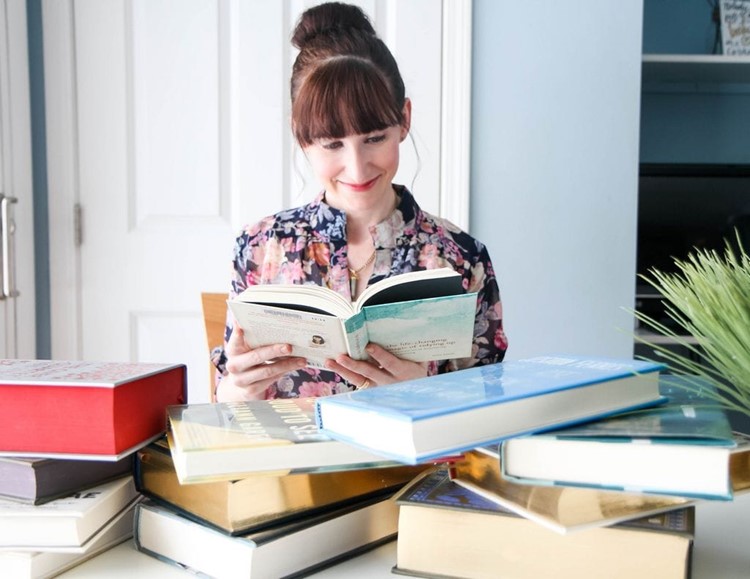
I am so excited to share about another incredible book that I enjoyed this month. Be Frank With Me was included in my March Must-Read recommendations and once you read it, you will know exactly why. It is a charming, funny, and heartwarming story that I enjoyed from start to finish.
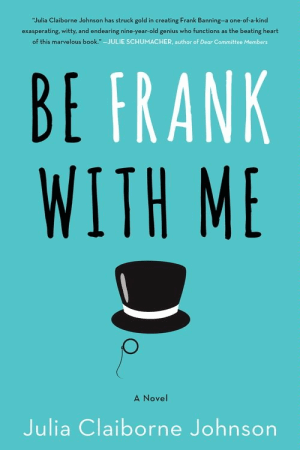
Reclusive literary legend M. M. “Mimi” Banning has been holed up in her Bel Air mansion for years. But after falling prey to a Bernie Madoff-style ponzi scheme, she’s flat broke. Now Mimi must write a new book for the first time in decades, and to ensure the timely delivery of her manuscript, her New York publisher sends an assistant to monitor her progress. The prickly Mimi reluctantly complies—with a few stipulations: No Ivy-Leaguers or English majors. Must drive, cook, tidy. Computer whiz. Good with kids. Quiet, discreet, sane.
When Alice Whitley arrives at the Banning mansion, she’s put to work right away—as a full-time companion to Frank, the writer’s eccentric nine-year-old, a boy with the wit of Noel Coward, the wardrobe of a 1930s movie star, and very little in common with his fellow fourth-graders.
As she slowly gets to know Frank, Alice becomes consumed with finding out who Frank’s father is, how his gorgeous “piano teacher and itinerant male role model” Xander fits into the Banning family equation—and whether Mimi will ever finish that book.
Frank is one one of the sweetest characters that is so perfectly formed that you just want to give this sweet little boy a hug when you get done with this book. I found myself giggling through some of Frank’s antics and well up when he just couldn’t fit in with his peers. I can’t imagine the research that went into forming all of Frank’s numerous thoughts about actors, movies, and all the fun facts that he had gathered over the years that seemed to consume him. The supporting characters were just as fascinating especially Frank’s eccentric mother.
The only criticism with this one is the ending felt unresolved and wasn’t wrapped up very tidy- it just left me dangling. I am wondering if that is because the author plans a sequel. If so, I can’t wait to read it because I already miss Frank.
Now grab that cup of coffee and settle in for my interview with Julia Claiborne Johnson
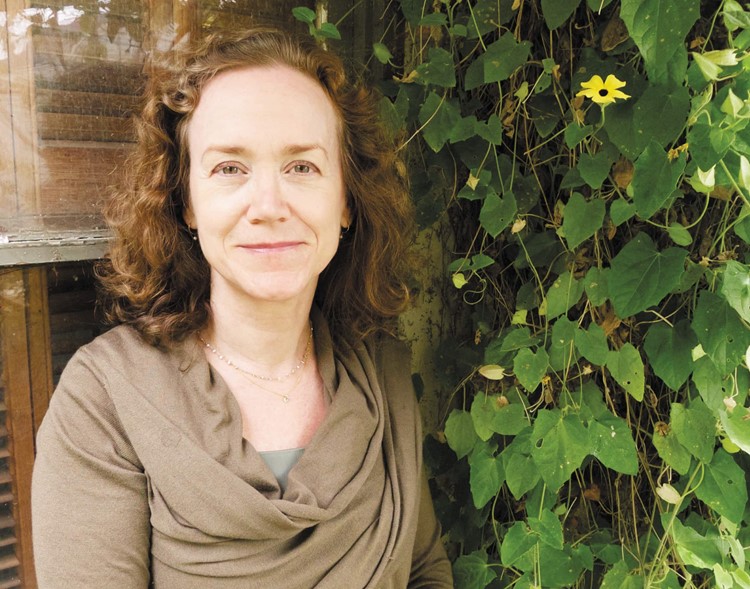
I understand that your debut novel took you five years to write and then one year to edit. What was the writing process like for you over those five years and what helped you persevere for that long to fulfill your dream of writing a book?
Once I got the idea for this book, I felt compelled to write it because its central question seemed so fascinating to me. What’s it like to be the mother of somebody who’s so different from most children that it makes life difficult for everybody? How did Albert Einstein’s mother manage, for example? I wanted to read the Walter Isaacson doorstopper bio of her. Since I couldn’t find a version of that book, I decided to write one. In the beginning, in fact, my novel was called Einstein’s Mom. Until Frank took over. As Frank is prone to do.
Please note: My book is only half-doorstopper in length. Although I wrote thousands of pages before winnowing it down to the 300 or so I ended up with, I wanted my novel to be quicker and lighter than a 750-pager would be. And by “light” I hope I’m not suggesting it’s shallow. I think it’s funny, but during that last year of copy-editing I had to read the final version over and over, sometimes twice in a week, and it still broke my heart every time.
As for the sticking with it until the book was finished, well, if I’d given up anywhere along the way, all the weeks and months and years of work I’d done already would have been for nothing. So I stuck with it.

(source: wikipedia)
Frank is absolutely obsessed with old Hollywood and facts just spilled and spilled and spilled onto the pages of your book. How much research did you do to prepare for a character like Frank and what is one of the most surprising facts (or favorite Frank fact) that you discovered while researching for this character?
Well, I’ve lived in “Old Hollywood” for the past twenty years. You can walk to Paramount Studios where Fred and Ginger used to dance from my house in Hancock Park, a neighborhood built up in the 1920s and so about the same age as Old Hollywood itself. I’m a ten-minute drive away from what used to be Mann’s Chinese theater, where stars’ handprints are immortalized in cement. The first neighborhood I lived in when we moved out here, Whitley Heights, was walking distance from the handprints. Gloria Swanson, Rudolph Valentino and Jean Harlow all lived in Whitley Heights. I loved all that Old Hollywood stuff before we came out here, and once we got here I was swimming in it day and night. So everything I soaked up over the years ended up on the page.
You know what my favorite Frank fact was? That George Gershwin died in what was the old Cedars Sinai Hospital, a building now owned by the Scientologists. It’s a huge, and painted bright blue these days. I already knew that fact before I wrote the book, and was so delighted to have the chance to use it. My own children were born in the new Cedars Sinai. When I was being rolled into the delivery room to give birth my son, the nurse who was in charge of me leaned over me and whispered “Kim Basinger had her baby in this room.” So you see what I mean. “Hollywood” is everywhere out here, whether you like it or not. Luckily for me, I liked it.
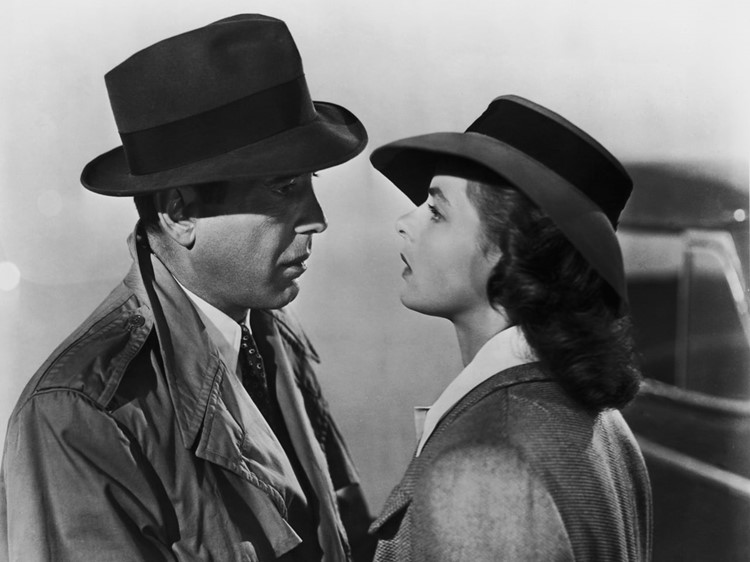
What is your favorite old Hollywood film?
I really love Casablanca, which shouldn’t shock you if you read my book since it pops up in it more than once. It was so smart and witty, and I always watched it when it came on television when I was in high school. Years later, I had a teacher who was my all-time favorite named Leslie Epstein. He was arid and hilarious to me in exactly that same way the characters in Casablanca were. Turns out his father and uncle were the identical twin screenwriters who wrote Casablanca. Which thrilled me to pieces, as you can imagine. I love the idea that a wonderful thing like a particular sense of humor can be passed down from generation to generation, the same way a nose or hair color is.
Despite our abilities as a reader to come to our own conclusion that Frank likely has Asperger’s syndrome, you deliberately chose not to give a label on why Frank was the way he was. Why was it important to you to not include that and do you think it would have changed the plot in some way if Mimi & Frank had uncovered this through their time with the psychologist?
Well, Alice isn’t in on those sessions. That very topic was probably discussed there. But listen, Frank’s diagnosis wasn’t what mattered to me. Frank mattered. I was writing a novel about a unique character, not a psychology textbook. I was very firm in my decision not to label him with anything. I felt saying “Frank is on the autism spectrum” diminished the reader’s experience of his gradual unfolding as a complex individual. I didn’t want anybody going in with preconceived assumptions about him.
Beyond the “is he or isn’t he on the spectrum,” I was also aiming to write a book about how hard it is to be unusual for any kid, and how helpless it makes parents feel to see their children suffer. Tall, short, fat, skinny, slow on the uptake, too smart for your own good—being different hurts when you’re young. School works best for the kids in the middle. For the outliers, it can be so painful.
Your husband is a comedy writer and there are so many great one-liners in this book that I found myself laughing out loud. Did your husband contribute in any way to some of the humor you added to this story?
Would my novel be less funny if I weren’t married to a comedy writer? I hope that’s not the case. I guess it would be fair to say that living in a house where wit is valued ups my game in a general way. But I was born funny. My husband was born funny. We fell in love with each other because like prefers like—the way the prom queen falls for the prom king because they’re both young and hot and beautiful. So no, aside from being delightful company, my husband didn’t help me in any concrete way. He doesn’t read much fiction anyway. He’s non-fiction all the way. In fact, he only read my manuscript twice—the very first draft, and then, years later, the last draft. His biggest contribution was saying to me, “I don’t know. It seems good.”
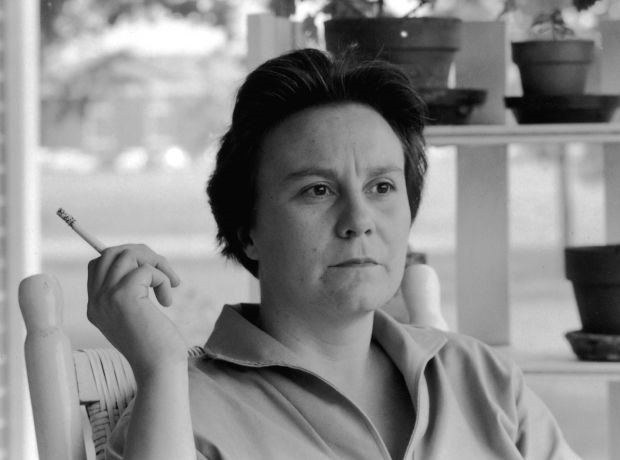
I read that you created Mimi, the reclusive author known as M.M. Banning, as a mash-up of Harper Lee & Salinger. Did you find it quite ironic when Harper Lee’s book, Go Set a Watchman, ended up being published much like Mimi’s work would be?
How crazy is that? I never would have guessed that would happen, though of course I’d tried to imagine what it would be like if something like it did. And then it happened! My agent sent me a clip about all that after my novel had sold already and was being edited. And here’s the kicker—Harper Lee and I have the same publisher—HarperCollins. Go figure. That’s some kind of crazy kismet.
I have to imagine that Frank was your favorite character to write, but did you have any other favorites that you really loved crafting for this book?
You know who I loved most of all? Mr. Vargas. In my mind he was two of my favorite wise, kind and patient men shaken up together into one: My husband and my old teacher, Mr. Epstein.
Some of the hardest scenes for me, as a reader, were reading about Frank’s struggles with his peers and his inability to fit in at his school. One of my favorite lines, in fact, comes from Isaac when he said, “Frank will be okay, Alice,’ Mr. Vargas said. ‘He’s an odd duck, but brilliant children often are. It may take him a while, but someday he’ll figure out how to live in the world of ordinary mortals.” Was there any scene that you really had a hard time writing for Frank?
I don’t want to reveal plot points, but the scene where Alice goes to the school to hear Frank’s student of the week presentation made me cry as I was writing it. Which is embarrassing to admit. But it kills me. I didn’t realize what was about to happen when I started putting that scene together. Of course, neither did my narrator Alice. I guess she’s a lot tougher than I am because it didn’t bring her to tears. Not on the outside, anyway.
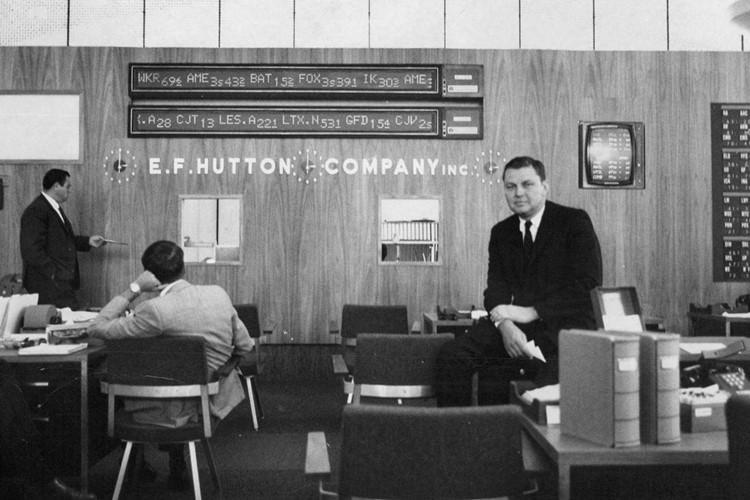
Frank’s fashion stands out so much that it is almost a character in itself. I understand that you have worked in the fashion world so did you have a blast creating Frank’s wardrobe? Did you have a favorite outfit for Frank that you wrote?
I did work as a writer at fashion magazines when I was young. I was boggled by the people in the fashion department—I’d never really encountered visual genius before, but I sure knew it when I saw it. So what if they couldn’t put a coherent sentence together any better than I could put together an outfit? I could write about their clothes forever even if I couldn’t translate what they told me unto anything I put together on for myself. I wanted Frank to be as fabulous as those fashion people were. I wanted everyone to know as soon as they saw him that this Frank kid was something else. Which, of course, can as much a good thing as a bad thing when you’re a kid.
As for my favorite of them all, I was kind of a sucker for the E.F. Hutton suit. There’s just something so hilarious to me about a little boy in a pinstripe number a middle-aged, all-business guy would wear. And that pinstripe suit had real fashion possibilities. Like the Audrey Hepburn little black dress, it was a canvas a fashion savant could build on. Frank could switch it up with pockets squares and cravats, just like an investment banker would. Although I guess an investment banker would probably steer clear of cravats.
It is unusual for an audiobook to come out before the book, but that is what happened with your book. Why did the publishing house decide to do this with your debut novel and did it help with sales? I also understand you declined being the voice of your audiobook. Why didn’t you want to do that as the author?
I think it was an experiment, to see what would happen if the book came out on audio first. I was up for it experimenting. It sold really well that first weekend, too, I think. Plus I was thrilled to pieces that there was an audio version available, since someone in the very first book group I did has eye issues and couldn’t have experienced the book otherwise. Also, I myself have “read” many books while ironing, weeding, driving or exercising. It’s nice to be able to experience books with your ears and brain when you need to use your hands for something else.
I didn’t want to read for my audiobook myself because I am no actress. Also, I have kind of a hilarious Southern accent, which I don’t notice until I hear a recording of myself. Then I think, Sheesh, you have got an accent on you, girl. I don’t think for the life of me I could have made it go away while I was reading Alice, who is from Nebraska, and the main voice you hear throughout the book. So for those reasons it seemed like a terrible idea for me to read it. Tavia did a great job, didn’t she? I picked her because she was so amazing at doing Frank.
That’s the easiest question you’ve asked me! My favorite book in the world is Bel Canto, by Ann Patchett. It’s beautifully-written, wonderfully imagined, and completely heart-breaking. In it, terrorists seize the mansion of the vice-president of an unnamed South American country during a party that’s being thrown for a Japanese industrialist lured there with the promise of a performance by his favorite opera singer. The industrialist comes, the opera singer performs, guests from all over the world are in attendance; but the terrorist’s real target, the country’s president, skips the party to stay home and watch his favorite telenovela. As the standoff stretches from days into weeks, the hostages and captors for a community that you know can’t last. I’ve read this book so many times that I still have to keep a box of tissues at my elbow for the end game.
And here’s the thrilling footnote to all this: I don’t know what would have happened to Frank without Ann Patchett. When I finished the first draft of my novel late one night, I looked up the name of her agent and sent that agent an email about it. A week later, Ann Patchett’s agent was my agent, too.
You can connect with Julia Claiborne Johnson on Twitter or through Facebook! I’m always thankful for these moments with writers and I hope you will pick up this amazing book! You can always connect with me on GoodReads, through our books section of our site, and you can read our entire Sundays With Writers series for more author profiles. Happy reading, friends!
*This post contains affiliate links!